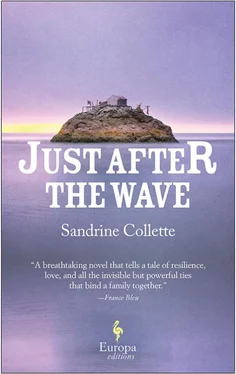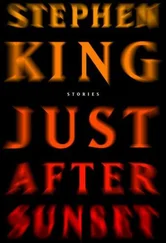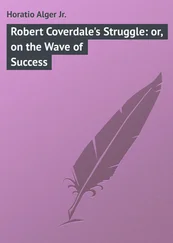“There’s nobody left,” cried Noah, after running around the house.
Louie and Perrine did not protest: the three of them are nobody. They don’t really exist anymore.
All that’s left is the rising sea.
Day one of wandering.
Stupor keeps them riveted to the hill. One thing makes Louie fly off the handle: the hens squawking to be fed. He eventually kicks them away.
“Shut up! Shut up!”
All they had ever wanted was more time to play, but now they don’t know how to fill the hours. There is a terrifying void inside which prevents them from thinking, moving, even talking sometimes. Never has their land been so silent.
They don’t dare get separated. They follow each other for everything, they walk together around their plot of land as if the parents might be hiding somewhere, they keep close together to go back to the house to eat a pancake, tidy the kitchen, turn their sheets back at night.
They constantly return to the shore, to the water’s edge, where they sit side by side. A part of them has not yet understood, not yet accepted. Noah asks:
“When are they coming back?”
Louie’s furious gaze: They’re not coming back.
“Yes they are,” says Perrine. “Madie said so in her letter.”
Louie stamps his foot on the ground.
“They’re not coming back.”
“They said they would.”
“They’re liars.”
Noah starts crying again. Don’t worry, whispers Perrine, it’s not true, what he said, he’s the liar. But her eyes are stinging, little Perrine, she’s not all that sure what the letter has promised. That they’ve gone away, yes, the mother does say that. That there wasn’t room enough on one boat. As soon as they’ve found higher ground, the father will come back—“which means he’ll come and get us, you see, Louie, you’re full of nonsense.”
Noah looks his sister right in the eye.
“Are we going to die?”
At the bottom of the letter the mother wrote that they have to keep adding wood so the fire in the stove won’t go out. And that they have to eat the hens. That she has left enough food, if they share it every day, and that she loves them all, Perrine, Louie, and Noah: those were her last words. But whether they’re going to die or not, she doesn’t say. Perrine turns the paper over. There’s nothing written on the back. So she repeats it to herself: “Die?”
She doesn’t really know what it means, or how it happens. Neither does Noah, actually, he’s heard his parents say the word but he’s hardly seen anything more than fish or poultry lifeless in the kitchen sink, and that is how he pictures death, in fact: when you don’t move anymore but your eyes are open. And sometimes there’s some blood on your body.
“No,” says Perrine after a long pause.
Not that she’s completely sure: she answered on principle.
“And what about them,” continues Noah, “Pata, Madie, and the others, are they dead?”
“I don’t think so.”
“I wish they were dead.”
Louie looks up. Me, too. Perrine frowns.
“You mustn’t say that.”
Noah shakes his head. I wish they were. They shouldn’t have left us.
Later, all three of them lie down on the shore, they stop moving, stop speaking. They keep their eyes open, blinking as little as possible. They want to know what it’s like to be dead, they wait a few seconds, a few minutes. Noah gets impatient and wiggles, Louie scolds him.
“This is stupid,” says the little boy, sitting up.
And then:
“I’m hungry.”
Perrine glances over at Louie, who hasn’t reacted. She too is finding this immobility difficult, so the thought of eating something brings her to her feet. She’s used to helping her mother in the kitchen; what she likes best is making cakes.
“Noah, go get a log.”
The little boy runs off.
Louie’s stomach is rumbling. They have lost track of time. Does it matter? He grumbles.
“I’m not hungry.”
But Perrine is not their mother. She doesn’t insist, doesn’t ruffle his hair and ask him what’s wrong. Doesn’t shrug or pull him along behind her. She walks back up to the house next to Noah, he carries his log, out of breath. So Louie stops being dead and catches up with them.
“What are we going to eat?”
Perrine doesn’t know. It’s one thing to help out in the kitchen, another thing to come up with a meal. She thinks about the days gone by, what her mother used to make. She’ll do the same. And like it said in the letter, make portions for each day. On a sheet of paper she writes down what they will eat. At the same time she sets the food out in little piles on the table: one for the first Wednesday, one for the first Thursday, and so on. This reassures her. If they stick to her list, they’ll easily have enough. She nods: “That’s it, then.”
Noah smiles: They’re pretty, those little piles.
In the afternoon they wander around the hill. Louie stares at the hens pecking at the close-cropped grass; he gathered their eggs, laid them carefully side by side in a basket. They return to sit at water’s edge, tirelessly, even if the chances of seeing the boat now are nonexistent. The rain stopped that morning, the sun is baking. They lie on the ground, facing the horizon, exhausted by emotion. With their half-open eyes they keep watch on the expanse of water. The hope that their parents will return has not totally disappeared. They fall asleep, unawares, and when they wake they are sunburnt. Noah has a headache and cries.
“I want Mommy.”
Perrine and Louie try to console him, in vain. His sobs turn to moans, he would like to stifle them but cannot, he begins to tremble, his hands stretched toward the open ocean, he stammers, Mommy, Mommy…
It’s silly, but what can they do, anyway, when they see him so unhappy the two older children begin to cry, too. And besides, they’re not the eldest; they feel tiny on this planet which, for the first time, is hostile toward them—tiny and lost, they don’t know what to do, they no longer know how to live, or why. Two weeks is too long. One day, yes, that they could understand, or even two or three. But now it’s getting all muddled in their heads. Two weeks is infinity, something unimaginable and terribly impossible. They miss their parents, and this hollows out their bellies, leaves a lump in their throats. Abandonment has begun.
Only exhaustion restores calm.
On her sheet of paper that evening Perrine crosses off the day and all three of them look at the number of days remaining. It’s huge. Not one of them has any idea what their life will be like during this endless period that lies ahead.
“I wish the planet would sink tonight,” says Louie.
Noah frowns.
“Planets don’t sink.”
Sitting on their beds, they stay up late, exchanging a few meager words to fill the silence and, once anxiety returns, to forget the sound outside of the rising wind and the shutter hooks banging against the walls. To drift off without noticing into an unquiet rest, broken by tears, all three of them in the same bed, otherwise it’s too scary. And to dream of Madie, of her warm arms, her lovely smile when she kisses them in the evening before they go to sleep—Madie who is no longer there except in the space of a dream, she left without them, they sob in their sleep, they’re almost dead.
By the second morning, they are already little animals, pale and hairy, wordless creatures who rub their eyes as they look at each other, grumpily, as if each one of them was guilty for the terrible abandonment, as if anger had grown during the night and all it would take was one misstep, one word, one gesture too many, a sneeze. They get dressed without washing, without combing their hair—in fact they don’t get dressed, they simply put trousers over their pajamas and go barefoot to the kitchen where there is no smell, no movement. Then they look at each other and remember; until now it was only a dream. Noah sits on the floor. They wait.
Читать дальше












